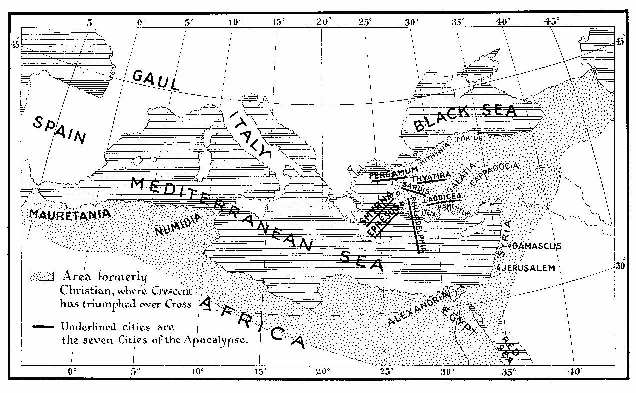“What thou seest,
write in a book, and send it unto churches which are in Asia; unto Ephesus, and
unto Smyrna, and unto Pergamos, and unto Thyatira, and unto Sardis, and unto
Philadelphia, and unto Laodicea.”
REVELATIONS, I:11
THE MARTYRED CITY
Glory
and Queen of Island Sea
Was
Smyrna, the beautiful city,
And
fairest pearl of the Orient she—
O
Smyrna the beautiful city!
Heiress
of countless storied ages,
Mother
of poets, saints and sages,
Was Smyrna, the beautiful city!
One of the ancient, glorious Seven
Was Smyrna, the sacred city,
Whose
candles all were alight in Heaven—
O
Smyrna the sacred city!
One
of the Seven hopes and desires,
One of the seven Holy Fires
Was Smyrna, the Sacred City.
And six fared out in the long ago-
O Smyrna, the Christian city!
But hers shone on with a constant glow—
O Smyrna, the Christian city!
The others died down and passed away,
But hers gleamed on until yesterday—
O Smyrna, the Christian city!
Silent and dead are churchbell ringers
Of Smyrna, the Christian city,
The music silent and dead the singers
Of Smyrna, the happy city;
And her maidens, pearls of the Island seas
Are gone from the marble palaces
Of Smyrna, enchanting city!
She
is dead and rots by the Orient’s gate,
Does
Smyrna, the murdered city,
Her artisans gone, her streets desolate—
O Smyrna, the murdered city!
Her children made
orphans, widows her wives
While under her
stones the foul rat thrives—
O
Smyrna, the murdered city!
They
crowned with a halo her bishop there,
In
Smyrna, the martyred city,
Though
dabbled with blood was his long white hair—
O
Smyrna, the martyred city!
So
she kept the faith in Christendom
From
Polycarp to St. Chrysostom,*
Did Smyrna, the glorified city!
*Martyred
at Smyrna, September 1922.

FOREWORD
HERE at last is the truth about the destruction
of Smyrna and the massacre of a large part of its Inhabitants by one who was
present.
The writer of the following pages is a man, happily, who
is not restrained from telling what he knows by political reasons or by any
consideration of fear or self-interest. He gives the whole story of the savage
extermination of Christian civilization throughout the length and breadth of
the old Byzantine Empire in a clear and convincing manner
That it should have been possible twenty centuries
after the birth of Christ for a small and backward nation, like the Turks, to
have committed such crimes against civilization and the progress of the world,
is a matter which should cause all conscientious people to pause and think; yet
the writer shows conclusively that these crimes have been committed without
opposition on the part of any Christian nation and that the last frightful
scene at Smyrna was enacted within a few yards of powerful Allied and American
battle fleet.
We turned a deaf ear to the dying Christians,
when they called to us for aid, fully aware that America was their only hope,
and now it would appear that there is a growing tendency in this country to
whitewash the Turks and condone their crimes in order to obtain material
advantages from them.
The author takes the position that this can not be done,
as the Turks have put so great an affront upon humanity that it can not easily
be overlooked, and the truth is sure to come out. He
claims that high ideals are more than oil or railroads, and that the Turks
should not be accepted into the society of decent nations until they show
sincere repentance for their crimes.
Fraternizing with them on any other terms creates
a suspicion of sordidness or even complicity. From the outspoken nature of this book it will be evident to the reader
that the writing of it has required considerable courage and that it has been
inspired by no other possible motive than a desire to make the truth known
about matters which it is important for the world to know.
(Signed) JAMES W. GERARD
Next: Introduction | Previous: Title Page | Book Contents | Book main page